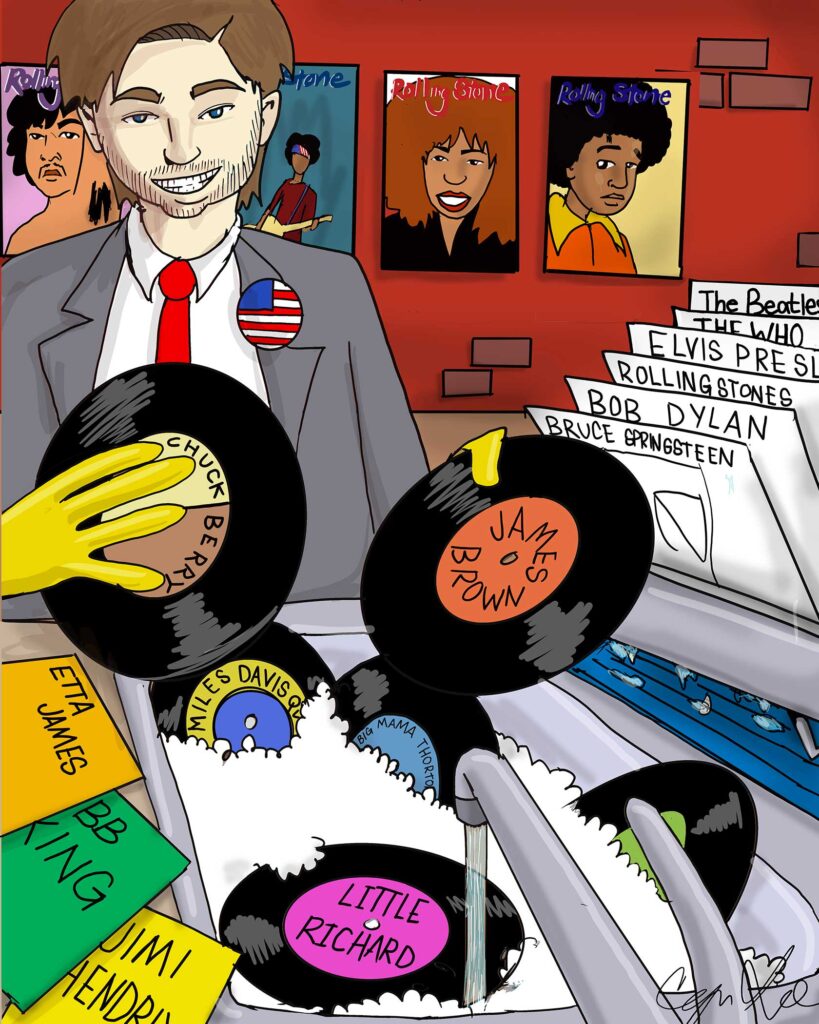
Former Rolling Stone publisher Jann Wenner just released his new book, identifying the artists that he views as the greatest musicians of the modern era. In his assessment, he failed to include any Black or women musicians … so I guess we shouldn’t be surprised that he refers to his white male subjects in the title as “The Masters.”
Wenner honors musicians Bono, Bob Dylan, Pete Townshend, Mick Jagger, John Lennon, Bruce Springsteen and Jerry Garcia. Now, you would think that in the 21st century, the longtime publisher of an iconic magazine would be acquainted with Google. If Wenner took his head out of his cloud of white supremacy, he would realize all of these artists were influenced greatly by Black blues, R&B and early rock-and-roll artists of the 1950s and 1960s. He could have found that out in the assessments of writers, fans or other musicians. Or he could just listen to these seven musicians speak in their own words.
Mick Jagger of the Rolling Stones said, when referring to the great Little Richard, “He was the biggest inspiration of my early teens.” Jagger went on to say, “He was a brilliant performer who inspired me from the beginning.”
Wenner also failed to acknowledge Lennon’s own words quoted in Jet. The Beatles star visited the magazine’s new Chicago offices in October 1972 with Yoko Ono and his good friend, comedian and civil rights leader Dick Gregory. There, Lennon, who was from the port city of Liverpool in England, shared the story of his musical origins.
“I grew up with blues music, country and western music. The sailors came in, brought folk music [of] all kinds. I was at college and listened to the music,” Lennon said. “It was an easy progression to R&B via Bo Diddley, Chuck Berry and Little Richard. First I heard Leadbelly, then Robert Johnson and Sleepy John Estes. From there I went to Chuck Berry and the other R&B artists in 1958. I did not discover B.B. King, Mary Wells, T. Bone Walker and Albert King until the 1960s.”
Lennon went on to say Black music was more than just an inspiration. “I was given back my body in the 1950s by Black music. I appreciate it, and I’ll never stop acknowledging it — Black music is my life.”
Pete Townshend of The Who acknowledged that the music he and many of the British “guitar gods” were playing was actually not their creation, but their version of Black blues music. In a 1989 Guitar Player magazine interview, he talked about Jimi Hendrix’s performances in England in the late 1960s, saying, “When he took his music back he took a lot of the trimmings with it too.”
Garcia, legendary founder of the iconic rock band The Grateful Dead, was inspired by Black influences, according to his own guitar player, Phil Lesh. He said in a 2022 Forbes magazine interview, “The basic inspiration for the Grateful Dead was Miles Davis Quartet with Coltrane or Trane’s quartet from the early ’60s. So that was pretty much the inspiration for the way we approached music.”
Comedian Jon Stewart suggested Springsteen owed his music partly to the greatest soul singer of all time. In a 2009 speech introducing “The Boss,” Stewart said, “What I believe is this: I believe that Bob Dylan and James Brown had a baby. … They abandoned this child on the side of the road, between the exit interchanges of 8A and 9 on the New Jersey Turnpike. That child is Bruce Springsteen.”
Dylan based most of his early songs on the rhythm, cadence and messages of the blues. The plight of African Americans was the topic of many of his classics. When he sang, “How many roads must a man walk down before they call him a man?” he was referencing the civil rights movement. Barack Obama asked Dylan to headline his 2010 concert at the White House’s star-studded Black History Month celebration. When America’s only Black president so far selects a white artist for that role, you know that white brother has a lot of soul.
With all that background information available, how could Wenner not include the Black musicians who influenced his narrow-minded list of the so-called greatest? It is the height of white arrogance that someone who once considered himself a journalist could justify excluding Blacks and women with excuses like, “I mean, they just didn’t articulate at that level.”
For far too long, the impact of African American culture has been minimized. We cannot accept this ignorant assessment that disregards the country’s greatest cultural gift to the world — Black American music, the soul of America.







